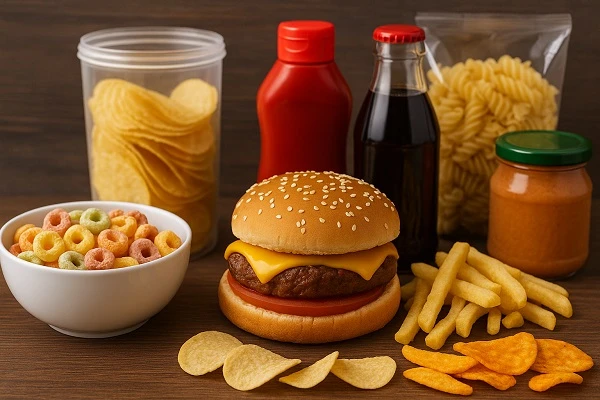Last Updated: July 2, 2025
The Silent Killer Inside Your Kitchen: What You're Eating Every Day Without Knowing It

What if the deadliest thing in your life wasn't outside your door—but inside your kitchen cabinets?
Every day, millions of people unknowingly consume ingredients that are slowly damaging their health. These aren’t illegal substances or rare toxins—they're items you buy from your favorite grocery store, consume at family dinners, and even pack in your kids' lunchboxes.
Meet the Silent Killer: Processed Foods and Toxic Additives
Processed foods, hidden sugars, and seed oils have quietly become the most dangerous elements in our diets. The worst part? They're everywhere—disguised as “healthy,” “natural,” or “low-fat.”
From flavored yogurts to breakfast cereals, salad dressings to granola bars, we’re being misled by labels while unknowingly feeding inflammation, heart disease, obesity, and even cancer.
The Hidden Culprits in Your Daily Diet
- Sugar: Added to almost everything—bread, sauces, even soups. Excess sugar is linked to Type 2 diabetes, obesity, and fatty liver.
- Seed Oils: Canola, sunflower, and soybean oils are highly processed and contribute to chronic inflammation.
- Refined Carbohydrates: White bread, pastries, and pasta spike your blood sugar and cause crashes.
- Artificial Additives: Preservatives, food coloring, and MSG can disrupt hormones and gut flora.
How These Foods Are Wrecking Your Body
Your body wasn’t designed to digest lab-made chemicals. Here’s what happens over time:
- Heart: Elevated cholesterol, clogged arteries, hypertension.
- Brain: Brain fog, memory issues, depression due to inflammation and hormonal disruption.
- Gut: Bloating, IBS, leaky gut from imbalanced bacteria and harmful additives.
- Liver: Fatty liver disease from excess sugar and toxins.
Real-Life Wake-Up Calls
Tom, 42, was a fast-food regular. He didn’t smoke or drink, but he suffered a heart attack. His cholesterol was sky-high, and his liver was struggling. A diet of “normal” foods nearly killed him.
Sara, a mother of two, was always tired. Her mornings began with cereal and low-fat milk, her lunches with flavored yogurt and granola bars. Turns out, her “healthy diet” was loaded with sugar and processed oils. After switching to whole foods, her energy levels soared.
What the Food Industry Doesn’t Want You to Know
Why are these ingredients still everywhere? Because they're cheap to produce, addictive by design, and highly profitable.
Marketing plays a huge role—words like “natural,” “gluten-free,” and “low-fat” often mean nothing. A low-fat product may have more sugar. A “healthy” bar might have 30 ingredients, most of which are unpronounceable.
So What Can You Eat?
- Whole Foods: Fruits, vegetables, whole grains, nuts, and seeds.
- Unprocessed Proteins: Eggs, grass-fed meat, wild-caught fish, legumes.
- Healthy Fats: Avocado, olive oil, ghee, coconut oil in moderation.
- Fermented Foods: Yogurt (unsweetened), kefir, sauerkraut for gut health.
Simple Swaps That Make a Big Difference
- Swap sugary cereals for steel-cut oats with fruit.
- Replace canola oil with extra virgin olive oil.
- Choose real butter over margarine.
- Make your own salad dressing with olive oil, lemon juice, and herbs.
Final Thoughts: Take Back Control of Your Kitchen
You don’t need a degree in nutrition to eat better. You just need awareness. Your kitchen should be a place of nourishment, not a silent threat to your wellbeing.
Start small. Read labels. Cook more. Shop the outer aisles of the grocery store. And most importantly—don’t believe the hype.
Your body deserves better. Give it the fuel it was made for—not the poison wrapped in pretty packaging.
You May Also Like:

How Your Smart TV Spies on You More Than Your Smartphone...

The Silent Strain: How Remote Work is Fueling a Global Mental Health Crisis...

Inside Pakistan’s Second-Hand Phone Markets: Real Risks & Real Buyer Stories...

The Battle Over the Women’s Category: Inside the Global Fight Over Trans Athletes in Sports...

The Silent War on Undersea Cables: Who Really Controls the Internet’s Backbone?...

A Special Condition Marked on Your HBL Account: Meaning, Causes, Fix and Your Rights in Pakistan...

The Hidden Cost of Free AI Tools: How You’re Paying With Your Personality Data...

